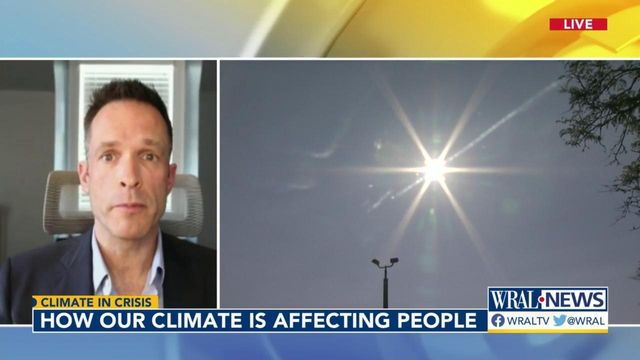North Carolina falling behind on carbon cuts, environmental group's analysis says
Despite recent executive orders and a major power sector bill last year, North Carolina needs new policies, more urgency, to meet governor's climate goals.
Posted — UpdatedNorth Carolina needs to pick up the pace on turning Gov. Roy Cooper’s climate change goals into action if it’s going to hit benchmarks the governor laid out, the Environmental Defense Fund said Monday.
North Carolina has made a series of important pledges, "but the true test of climate leadership is found not in plans and pledges, but in delivering results,” the group said in its report. “Success requires moving from setting these targets to deploying policies to drive decarbonization.”
In response a Cooper spokesman said the governor has prioritized climate policy, noting the same efforts the EDF's report described as "initial steps" and "meaningful progress." Spokesman Jordan Monaghan also said Cooper has "full confidence" that North Carolina is positioned to meet his goals.
The governor, "welcomes the collaborative engagement of diverse stakeholders to turn those goals into reality," Monaghan said in an email.
The EDF’s analysis was based on historic and projected greenhouse gas emissions data from the Rhodium Group’s U.S. Climate Service, the Defense Fund said, and it took into account state and federal policies as they existed in May of 2021.
Since then North Carolina passed House Bill 951, which shifts Duke Energy’s power plant plans, reducing reliance on coal for electricity production in the coming years. But even if the company hits the bill’s 70% emission reductions target by 2030, North Carolina’s will fall “well short” of Cooper’s overall target of a 50% reduction in greenhouse gases economy wide, the report says.
These percentage reductions are compared to 2005 levels of greenhouse gases—primarily carbon dioxide—which build up in the atmosphere, trap heat and raise the planet's temperature.
“Unless new climate and clean energy policies are urgently adopted, North Carolina will fail to meet its emissions reduction targets,” the report says.
The EDF report says that the state's commitments are “aligned with the scope of ambition needed to avoid the worst impacts of climate change,” though, and that meaningful progress has been made, putting Cooper’s targets within reach.
The report makes few recommendations, but says the state should consider boosting power sector carbon cuts beyond what House Bill 951 provided, and it urges rapid follow through on Cooper’s goal of getting 1.25 million zero emission vehicles on North Carolina roads by 2030.
Transportation is now the No. 1 source of emissions in the state, the group said, and when combined with the electric power sector the two produce nearly 70% of North Carolina emissions.
Related Topics
• Credits
Copyright 2024 by Capitol Broadcasting Company. All rights reserved. This material may not be published, broadcast, rewritten or redistributed.






